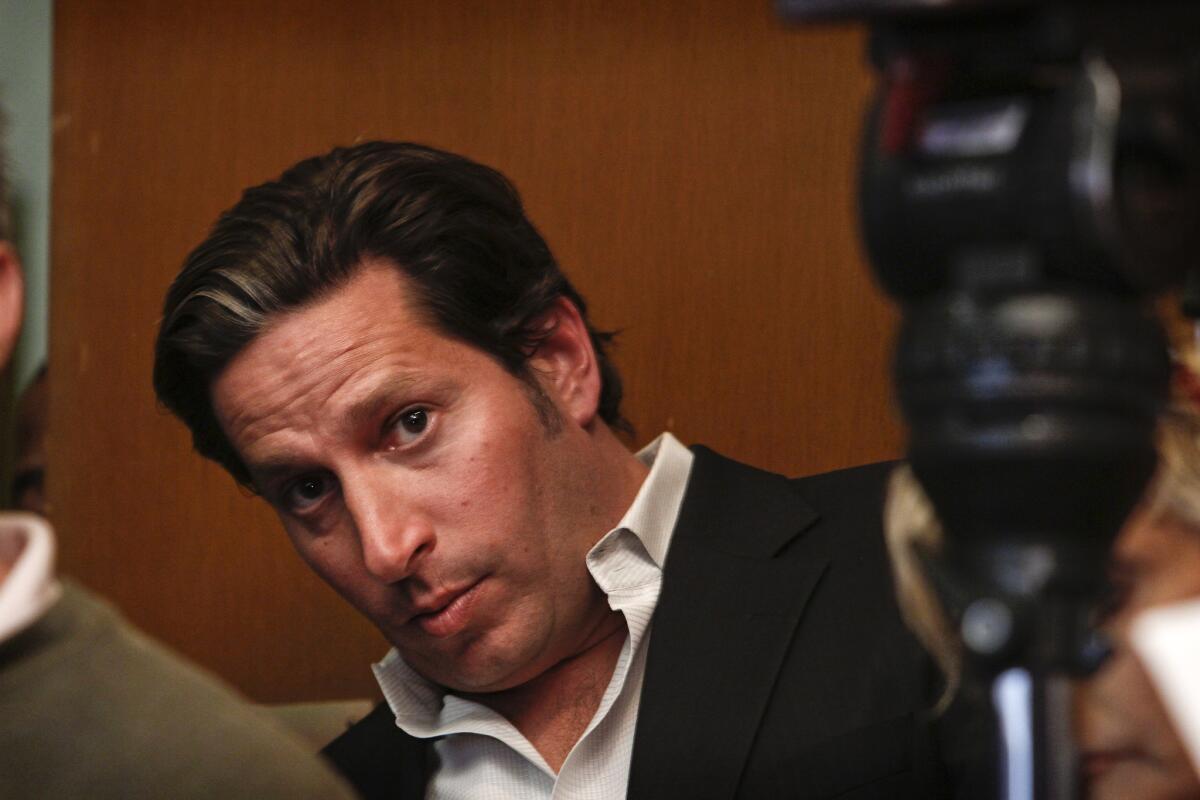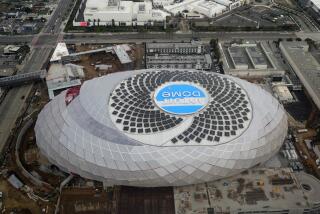Coliseum official’s own companies made $1.7 million in deals

Last year, Coca-Cola sent a $70,000 check to the Los Angeles Memorial Coliseum for its share of bottled water and soda sales at the historic stadium.
Then, said people familiar with the arrangement, the beverage giant got a curious call from a Coliseum representative with new instructions: Void that check. Coke was told to write a new one to a private firm -- a business owned by the Coliseum’s events manager, Todd DeStefano.
Coca-Cola complied, cutting a fresh check to DeStefano’s company after receiving an invoice from him on the commission’s letterhead, said the sources, who are not authorized to speak publicly.
The redirected money was part of at least $1.7 million that companies owned by DeStefano received in about two years of making his own deals with firms that had business before the Coliseum Commission, according to interviews and agency records. The sum far exceeds the tens of thousands of dollars previously disclosed in a widening scandal surrounding DeStefano.
Other firms that paid him while he oversaw them in his government job included moviemakers, liquor vendors and the producer of the Electric Daisy Carnival rave. That event was marred by scores of drug arrests and ambulance calls, and led to the death of a teenage girl.
After The Times reported DeStefano’s financial relationships, state and county authorities launched conflict-of-interest investigations into his affairs. DeStefano quit his Coliseum job in January.
In addition to his extra income, he billed the commission last year for $1,584 in massages, was paid a $600 monthly car allowance and received $21,000 in free tickets to concerts, football games and other events at the taxpayer-owned Coliseum and Los Angeles Memorial Sports Arena. Those perks are detailed in copies of his expense reports and other documents obtained under the California Public Records Act.
An attorney for DeStefano, James Blatt, said his client has done nothing wrong. Blatt said Coca-Cola sent its original check to the Coliseum Commission by mistake, and DeStefano’s company was entitled to the $70,000 for negotiating the contract that allowed the bottler to sell beverages at the Sports Arena and Coliseum, the former Olympics site that is home to USC football.
The lawyer said DeStefano’s boss at the time, former commission General Manager Patrick Lynch, approved the Coca-Cola payment to the private company. Lynch’s attorney, Tony Capozzola, denied that but acknowledged that his client ordered the first check returned to Coke.
Lynch did not know the money would go to DeStefano’s separate firm and never told Coca-Cola to write a new check, Capozzola said. Others with knowledge of the matter said they did not know the name of the commission employee who gave those instructions.
The Coliseum Commission’s finance director said Lynch told him last year that DeStefano’s firm had a contract with Coca-Cola that would earn the commission about $20,000.
“I asked him several times after that, ‘Where’s our money? Where’s our money?’” said the financial officer, Ronald Lederkramer. “He would say, ‘I’ll talk to Todd.’ But we never got any money.”
DeStefano, in fact, had no authority to sign the contract and the Coliseum’s concessions arm never received proceeds from it, the commission’s interim general manager, John Sandbrook, told The Times earlier this month.
Coca-Cola spokesman Bob Phillips said his company was “disappointed to discover that Mr. DeStefano may not have been authorized to act on behalf of the L.A. Memorial Coliseum in his recent dealings with Coca-Cola. We are making every effort to work with the L.A Memorial Coliseum Commission and other public entities to rectify this situation.”
The $70,000 from Coke is a fraction of what two companies owned by DeStefano, LAC Events and Private Event Management, pulled in while he was on the commission’s payroll.
The firms were paid about $800,000 last year by the rave company Insomniac Inc., to help it stage rave concerts, said people familiar with the outlays -- productions that fell under DeStefano’s normal responsibilities in his government job.
A second rave promoter, Go Ventures, has paid his firms about $876,000 since 2008 for work on Sports Arena shows, said the company’s chief executive, Reza Gerami.
DeStefano’s businesses also received tens of thousands of dollars from enterprises that shot film, rented space or had vendor contracts at commission properties. That income is shown in four years of state-mandated financial disclosures that DeStefano filed recently, after The Times reported that he had failed to submit them.
Blatt acknowledged that DeStefano’s take through his two firms -- on top of a government paycheck of as much as $189,000 a year -- “appears to be a significant number.” But he said it was justified by the years DeStefano devoted to drawing business to the site.
“Instead of being praised for bringing profitable events for the Coliseum on a continuous basis, he’s become a victim of his own success,” Blatt said.
The Coliseum and Sports Arena have been in the red since fiscal 2008-09, about the time that DeStefano’s side income began to grow substantially, according to county and state records and interviews.
The $800,000 in fees from Insomniac equaled the profit the commission hoped to earn this year from an Electric Daisy rave, according to agency financial documents. The event was canceled in the wake of the DeStefano controversy and has moved to Las Vegas.
The Los Angeles County district attorney’s office and state Fair Political Practices Commission are investigating DeStefano’s relationship with Insomniac. Three weeks ago, authorities took computers and other items from the homes of DeStefano and Lynch.
The Times has learned that district attorney’s investigators also have served search warrants at the office and home of Insomniac head Pasquale Rotella. And they have seized information from five banks, a district attorney’s spokeswoman confirmed.
An attorney for Insomniac and Rotella said investigators told him Rotella and the company are not subjects of the probe. Insomniac hired DeStefano’s firms in the belief that he “was the authorized representative of the Coliseum,” said the lawyer, Gary Jay Kaufman. “Insomniac has done nothing wrong and always conducted itself in a legal and ethical manner.”
In February, Lynch resigned under pressure because he approved DeStefano’s side work with Insomniac. DeStefano left after the current president of the commission, David Israel, ordered him to choose between his government job and his work for Insomniac.
The Go Ventures executive, Gerami, said he, too, got Lynch’s go-ahead to retain DeStefano’s firms. Gerami said he was concerned that DeStefano had a conflict of interest, but Lynch assured him that DeStefano had his blessing. “I do business by the book,” Gerami said.
Lynch’s lawyer expressed doubt that his client had the conversation Gerami described. Capozzola said Lynch “was aware” that DeStefano worked for Go Ventures while employed at the Coliseum, but Lynch did not know how much money his firms were being paid.
Go Ventures agreed to pay DeStefano’s LAC Events a percentage of its concert grosses at the Sports Arena, from which the DeStefano firm covered certain expenses, including the $25,000 cost of leasing the venue, Gerami said. He said DeStefano did a good job, and no one at the commission advised him that DeStefano’s government duties included the same tasks.
DeStefano’s massage expenses were for a back injury he suffered on the job, his lawyer said. DeStefano billed them as expenses because it was easier and less costly than filing a workers’ compensation claim, according to Lederkramer, the financial officer.
DeStefano received the car allowance because he drove to meetings on commission business, said Sandbrook, the interim general manager.
Commission policy allows staff members to get free tickets to “obtain firsthand knowledge” of event operations.
He also received a 50% rental discount and free guest parking -- breaks generally not available to the public -- when he held his 2009 wedding reception at the state’s California Science Center, next to the Coliseum.
A spokeswoman for the center, which cooperates with the commission on various events, said DeStefano received the discounts -- worth an estimated $3,400 -- as a “good neighbor courtesy.”
The discounts are normally restricted to center employees, said spokeswoman Shell Amega.
The manager of a state office that oversees parking at the center said he regrets waiving the fees for DeStefano. “It’s something that shouldn’t have been done,” said the manager, Eddie Kouyoumdjian.
More to Read
Sign up for Essential California
The most important California stories and recommendations in your inbox every morning.
You may occasionally receive promotional content from the Los Angeles Times.












